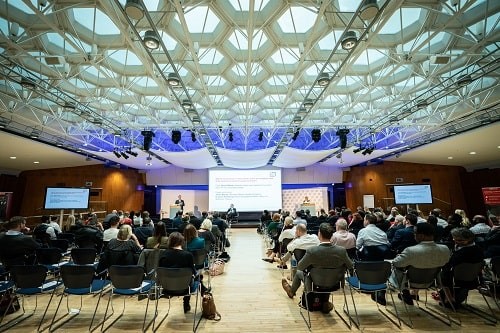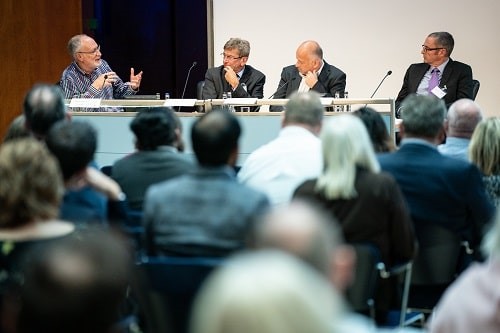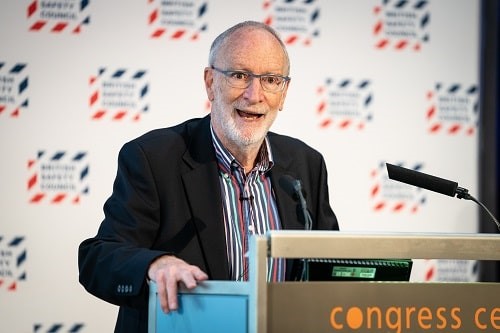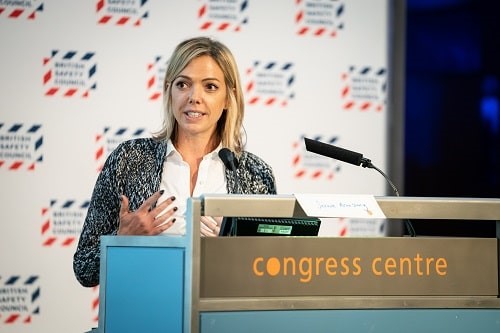“There’s a growing recognition that it is intolerable to continue to shout safety and whisper health. The rebalancing around health and wellbeing is a theme of today,” said Lawrence Waterman, welcoming audiences to British Safety Council’s 11th annual conference, held on 16 October at the TUC Congress Centre in London.
Features
Health, safety and wellbeing in the modern workplace: conference report
Setting the conference in the context of awareness and action around air pollution, the gig economy and Brexit, he compared current times to the late ’90s when a major shift occurred in risk perception and management. “We will look back at this period as being even more dramatically changing the way health and safety is seen, and the expectations people have and the professional practices that people can engage in,” he said.
The first speaker was Professor David Fishwick, chief medical officer at HSE. As a practising chest doctor, he is also an eyewitness to the tragedies caused by occupational lung disease: “I spend a lot of time holding people’s hands who are upset about the loss of their livelihoods directly due to exposures at work.” He said that it’s still somehow ‘taboo’ to talk about our health, and, although we’ve known the debilitating effects of silica dust, asbestos and other hazards, workers continue to be exposed to them. Fishwick showed us several shocking X-rays, including the chalky lungs of a 39-year-old silicosis patient, poignantly asking: “When will we learn?”
 British Safety Council’s 11th annual conference took place at the TUC Congress Centre in London
British Safety Council’s 11th annual conference took place at the TUC Congress Centre in London
Mental health
Moving things on to mental health, James Rudoni, managing director of Mates in Mind, gave an update on the charity’s work and reinforced some of its key messages. “We don’t talk about mental health at work. We don’t do it until it’s too late,” he said. Mates in Mind helps employers break the stigma and create spaces for people to talk to prevent problems building up. So far, 300 organisations have signed up to its programme and 216,000 employees have benefited from this.
 Professor Cary Cooper, Jonathan O’Neill, Kevin Rowan and David Fishwick on the panel session. Photograph: Harry Richards Photography
Professor Cary Cooper, Jonathan O’Neill, Kevin Rowan and David Fishwick on the panel session. Photograph: Harry Richards Photography
Liz Groundland, head of safety, health, environment and quality at Seddon Construction, gave a case study on the firm’s recent safety and mental health campaigns. ‘Think safety, stay safe’ was geared at delivering simple and memorable messages that could be heard above the noise of the naturally busy minds of the workforce. The loss of a young employee to suicide had also been the catalyst for a campaign on mental health. It featured staff talking of their own struggles with depression and grief in videos to help build a more supportive and open culture. “We needed to ensure his death wasn’t in vain,” she said.
Wellbeing: do we need laws?
Professor Sir Cary Cooper CBE gave a whirlwind tour of the pressing points in the wellbeing debate. In his study of 39,000 workers, 28 per cent were going into work despite being psychologically or physically sick. To combat this, employers need to act like doctors to diagnose and then treat the sources of work-related stress. “Massages at the desk are not the solution to the long hours culture, the glass ceiling for women, non-flexible work or line managers who lack interpersonal skills,” he emphasised.
 Professor Sir Cary Cooper CBE: "Massages are not the solution to workplace wellbeing"
Professor Sir Cary Cooper CBE: "Massages are not the solution to workplace wellbeing"
The future of health and safety regulation in the workplace was the basis for a panel session. Kevin Rowan, head of organisation services at the TUC, believed it was “not possible to regulate for a positive health and safety culture, but you can create an environment where people feel able to [raise issues]”, arguing for more safety reps in workplaces. Professor Cooper opted for guidance on stress as opposed to more regulation. Jonathan O’Neill OBE, managing director at the Fire Protection Association, said changes to building and fire safety regulations under debate now must be comprehensive: “Height is not the only definition of risk,” he said.
Chair Lawrence Waterman asked if a new law on mental health might not give HSE some ‘dynamism’ for change, but Fishwick said HSE had ‘finite resources’ and could not be expected to focus on mental health in place of health and safety incidents. The conference app showed the audience was 50/50 on whether we need more laws for health and safety.
Health: the ‘Cinderella’ of industry
Steve Perkins, leadership consultant, at his firm Steve Perkins Associates Limited, chose his talk to champion health. He said that handling of the big risks such as noise, dust and fumes tends to be done after the ‘easy’ work of wellbeing promotion. But he said: “You can’t yoga your way out of silicosis.” He reinforced his point by showing that just one per cent of deaths at work are due to safety, with the remaining 99 per cent due to diseases. He called health the ‘Cinderella’ of the industry, a point illustrated earlier by Liz Groundland, who said that it was harder to get employees on board with dust protection than for mental health and safety messages.
 Jennie Armstrong, head of OSH at Tideway. Photograph: Harry Richards Photography
Jennie Armstrong, head of OSH at Tideway. Photograph: Harry Richards Photography
The finale to the day was a debate centred on one question: has the recent focus on mental health within the workplace been at the expense of overall occupational health? Jennie Armstrong, head of occupational health, safety and wellbeing at Tideway, said it was not a binary issue, but a “big balancing act”, with mental health and health and safety risks all to be considered. James Murray, managing director at Vitality Health, said: “If mental health isn’t part of the core strategy, it’s going to fail.”
Mike Robinson, CEO of the British Safety Council, closed the day by thanking all those who had made the event possible. The conference had looked at the challenges ahead in a “rapidly changing environment” and he was sure the day had equipped the audience to be ready for the challenges ahead.
FEATURES

Sedentary working and how to combat the ‘sitting disease’
By Gavin Bradley, Active Working on 05 April 2024
Prolonged and excessive sitting poses a major risk to our health, but the Get Britain Standing campaign and On Your Feet Britain Day on 25 April are a great way of encouraging workers to sit less and move more.

Company culture and wellbeing: a crucial link
By Bex Moorhouse, Invigorate Spaces on 05 April 2024
Investing in measures to support worker wellbeing will be ineffective unless the company culture genuinely incorporates values like teamwork, involvement, flexibility and innovation.

Office design and culture: happier and healthier staff – or the opposite?
By Guy Osmond, Osmond Ergonomics on 03 April 2024
Applying ergonomic principles to workstation set-ups and ensuring the physical environment supports neurodivergent people are just some of the ways of creating an office where everyone can thrive, but a supportive and positive organisational culture is vital too.


